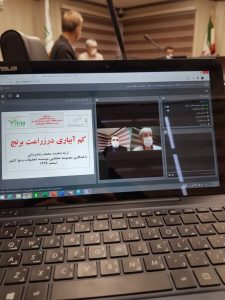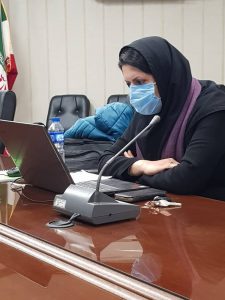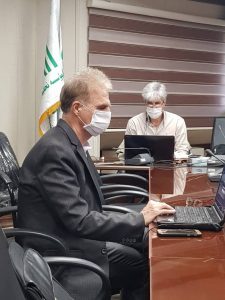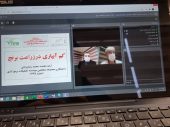Professional webinar meeting (information sharing and problem-solving) on deficit irrigation at the rice-growing province, problems, and solutions, Feb. 20, 2021
In collaboration with
The First National Conference on deficit Irrigation and the Use of Unconventional Waters in Agriculture of dry lands
National Water Event (Feb. 17 to Mar. 6, 2021) – Ferdowsi University of Mashhad – Mashhad – Iran

Rice Research Institute of Iran as the leadership of rice research and innovation will continuously focus on climate change and irrigation water scarcity across the country’s paddy fields to fulfill the current needs of farmers. Therefore, simultaneously with the comprehensive program of the National Water Event in Khorasan Province, and the first National Conference on deficit Irrigation and the use of unconventional water in agriculture of dry lands, which was organized by the Ferdowsi University of Mashhad in collaboration and the scientific hub of the deficit irrigation and the use of unconventional water in agriculture of dry lands of Ferdowsi University of Mashhad, RRII organized a professional meeting (information sharing and problem solving) on deficit irrigation at the rice-growing province, problems, and solutions on Feb. 20, 2021, in Kosar meeting hall of the RRII. Nine key speakers were lectured according to the following titles. It was attended by academic members, researchers, and exporters from RRII, Shiraz University, Ferdowsi University of Mashhad, Shahr –e- Kord University, and other related persons in the rice sectors.

The lecture titles were:
1- Deficit Irrigation in paddy fields, Dr. Yazdani, Academic Member of Rice Research Institute of Iran
2- Deficit Irrigation and proper distribution of irrigation water in water shortage and drought conditions in Speedroad irrigation network, Dr. Alipour Mobaraki, Senior Researcher of Rice Research Institute of Iran
3- Site-specific irrigation management zones, Dr. Rezaei, Senior Researcher of Rice Research Institute
4- Determining homogeneous zones of site-specific management of water holding capacity in paddy fields. Dr. Shakouri, Senior Researcher of Rice Research Institute of Iran
5- Rice Breeding strategies to cope with drought stress, Dr. Hosseini, Director General of Rice Research Institute
6- New drought-tolerant rice variety by mutation technique, Dr. Ebadi and Dr. Halajian, Academic member of Rice Research Institute of Iran and Atomic Agriculture Research Institute of Iran
7- Interval irrigation and nitrogen fertilizer management, Dr. Kavoosi and Dr. Mahmoud Soltani, Academic Members of Rice Research Institute of Iran
8- Second crops as a solution to increase the productivity of paddy fields, Dr. Rabiee, Senior Researcher, Rice Research Institute of Iran
9- Zinc management in different rice cultivation systems, Dr. Mahmoud Soltani, Academic Member of Rice Research Institute of Iran

The meeting statement
1- It is necessary to pay serious attention to modern irrigation methods, the possibility of using unconventional water to increase water use efficiency in paddy fields and maintain the stability of rice production
2- It is necessary to pay serious attention to develop the paddy field infrastructures (paddy field consolidation, irrigation, and drainage channels), and using alternative irrigation resources (Groundwater, unconventional water) to increase irrigation water use efficiency
3- It is necessary to pay more attention to breeding strategies to improve and introduce earliness, drought-tolerant, and aerobic rice cultivars for stress conditions
4- It is necessary to pay more attention to agronomy strategies including proper plant nutrition (macro and micronutrient managements), balanced nutrient application, determination of physical, chemical, and hydraulic properties of paddy soils to identify homogeneous areas for proper water management, effective weed, pests, and diseases control under drought stress
The rice research institute of Iran strongly believes that these solutions will emerge through continuous meetings, communications, and collaborations with other related organizations in the rice sector. Also, RRII believes that the output of these scientific relations will open new windows for the rice future researches, guarantee national food security.

